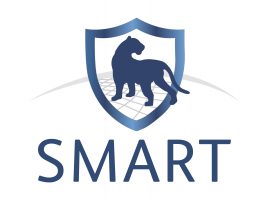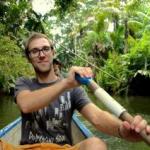Software and mobile applications are equally as important to conservation technology as the hardware used in the field. Increasingly developed specifically for #tech4wildlife needs, there are mobile apps and software options designed to help with protected area management, wildlife crime reporting, and anti-poaching patrol planning, data analysis, community science, data visualization and GIS mapping, outreach and engagement, and even conservation storytelling.
Likewise, mobile games have opened up new avenues for engaging the public in conservation efforts, allowing for immersive storytelling and interactive experiences. By combining cutting-edge technology and important conservation information with a media form already familiar to the public, conservationists are finding exciting ways to make audiences feel personally invested in critical species and habitats.
Whether you're looking for software and mobile app developers to help you with your own conservation tech needs, you have questions about development, you're looking for resources, or you'd like to share your own app, software, or gaming tools, this is the group for you!
Header photo: Trevor Hebert
- @mgmitche
- | he/him
University of British Columbia
- 0 Resources
- 0 Discussions
- 4 Groups
Faculty Manager for Higher Education. Lecturer in Animal Behaviour, Animal Welfare and Wildlife Conservation
- 0 Resources
- 0 Discussions
- 11 Groups
Tech for Conservation
- 0 Resources
- 2 Discussions
- 13 Groups
I am a ecologist and conservationist particularly excited about tech to aid biodiversity monitoring with a growing interest in analytics and AI. I am also a Project Manager at Rainforest Connection.
- 0 Resources
- 0 Discussions
- 8 Groups
- @cappel
- | she/her
- 0 Resources
- 0 Discussions
- 12 Groups
- @rgaston5
- | he/him
I am an educator, and a certified California Climate Steward. I have skills in machine learning and a passion for the environment and conservation
- 0 Resources
- 0 Discussions
- 13 Groups
World Wide Fund for Nature/ World Wildlife Fund (WWF)
WWF-Tanzania GIS Specialist/Developer/Trainer
- 0 Resources
- 1 Discussions
- 7 Groups
Parks Canada
Ecologist/Spatial Data Specialist/Nerd :)
- 0 Resources
- 2 Discussions
- 2 Groups
I'm new to wildlife technology but really want to get more involved in learning about the various technologies out there for wildlife and land surveys. I currently work in consulting and trying to find away to incorporate these applications to my job.
- 0 Resources
- 0 Discussions
- 7 Groups
- @Aurora
- | she/her
I'm a PhD student and the main topic of my research project is large carnivores' activity rhythms. I am passionate about statistical modeling, specifically through a Bayesian approach.
- 0 Resources
- 1 Discussions
- 6 Groups
Based in Australia, in the Blue Mountains and working with WWF-Australia on a new program "Eyes on Country". Working on the interface of tech, conservation and First Nations/Ranger groups.
- 0 Resources
- 3 Discussions
- 11 Groups
TerrOïko
Ecological data engineer

- 0 Resources
- 10 Discussions
- 6 Groups
Review by Professor Iain H Woodhouse
29 April 2024
In a recent publication we tested Underwater Passive Acoustic Monitoring (UPAM) as a feasible non-invasive technique to study the calling behavior of therathened aquatic Andean frogs under natural conditions in the...
6 April 2024
Article
visualization, annotation, and analysis of GPS and tag sensor data - a tour of the latest version
20 March 2024
Emerging trends for Nature-Based Solutions project assessments
8 March 2024
more affordable pricing for our software for the visualization and annotation of GPS and acceleration data
4 March 2024
Join us to help prevent biodiversity loss! Understory is hiring a postdoc to lead R&D Development on generalizing Computer Vision models for vegetation identification across space/time/phenotypes.
29 February 2024
Careers
The SMART Partnership is hiring a Program Director to oversee all aspects of the partnership's operations
21 February 2024
How Earth Blox reduced biodiversity impact analysis from 2 months to 1 hour for a global bank.
20 February 2024
The Wildlife Restoration Foundation is hiring a Conservation Technology Intern
8 February 2024
Two years in Cape Town, South Africa. Yearly visits to Rwanda. If you love to code, and all things Python/deep learning/tech stuff/ then you'll have an awesome time!
16 January 2024
Using geospatial data and the TNFD L.E.A.P approach to assess nature-related risks, impacts and opportunities in supply chains.
4 January 2024
SEE Shell is an innovative phone app that uses machine learning to identify products made from the shell of the critically endangered hawksbill sea turtle.
14 December 2023
July 2024
event
October 2024
May 2023
event
event
| Description | Activity | Replies | Groups | Updated |
|---|---|---|---|---|
| Hi Stephanie, Thanks for the link I hadn't seen it. It's very usefull. i realise I have listed a list of points without specific questions, here are a few: Do... |
|
Software and Mobile Apps | 4 years 8 months ago | |
| Lots of good ideas and advice from everyone. Time/money/quality/speed/etc tradeoffs, as always. Start with your minimum viable product, get it out there (at least to your... |
+6
|
Software and Mobile Apps | 4 years 8 months ago | |
| Monitoring and protecting vast protected areas and wildlife with limited resources and small teams is a huge challenge in Brazil and in... |
|
Software and Mobile Apps | 4 years 9 months ago | |
| For any projects or programs that involve community engagement and require robust data collection, Havuta has developed an app that helps... |
|
Software and Mobile Apps | 4 years 9 months ago | |
| Hello Wild Labs Community! I'm seeking advice on designing a generic database for wildlife enforcement. A big issue I... |
|
Software and Mobile Apps | 4 years 10 months ago | |
| https://github.com/LoRaTracker/GPSTutorial/tree/master/GPS%20performance%20comparisons I'm a bit late to this conversation, but in case anyone else is searching "gps... |
+1
|
Software and Mobile Apps | 4 years 10 months ago | |
| Hi Jenny, Interesting problem. I don't have direct experience, but it looks like there are some experts you can probably reach out to and ask... if you haven't... |
|
Software and Mobile Apps | 4 years 10 months ago | |
| The Knowledge Transfer Network helps businesses get the best out of creativity, ideas and the latest discoveries, to strengthen the UK... |
|
Software and Mobile Apps | 4 years 11 months ago | |
| The American Museum of Natural History’s Center for Biodiversity and Conservation (CBC) has released an open source tool to assist... |
|
Software and Mobile Apps | 4 years 11 months ago | |
| HI Robert, I have so many thoughts about this topic.. will try to keep them brief! It's definitely a discussion topic I'd like to throw around in the virtual... |
|
Software and Mobile Apps | 5 years 1 month ago | |
| Hi Everyone, I am a technology professional with years of experience managing large scale software development projects. I... |
|
Software and Mobile Apps | 5 years 2 months ago | |
| Hi Everyone, I am a technology professional with years of experience managing large scale software development projects. I... |
|
Software and Mobile Apps | 5 years 2 months ago |
Zoohackathon: 'END LOOP - Coding to end wildlife trafficking'
22 September 2016 12:00am
Engaging this community
23 August 2016 8:27am
Request for Expression of Interest for Individual Consultants to Conduct Remote Sensing and Geospatial Analysis
4 August 2016 12:00am
Video: Discover the SMART Approach
 The SMART Partnership
The SMART Partnership
20 July 2016 12:00am
Wildlife Crime Tech Challenge Accelerator Bootcamp
 Sophie Maxwell
Sophie Maxwell
24 June 2016 12:00am
Sustainable Palm Oil Transparency Toolkit (SPOTT)
 Alexis Hatto
Alexis Hatto
8 June 2016 12:00am
Internet of Elephants game play survey
16 May 2016 7:44am
TEAM Network and Wildlife Insights
 Eric Fegraus
Eric Fegraus
28 April 2016 12:00am
Can UAVs be Used to Measure Forest Quality?
 Tom Swinfield
Tom Swinfield
27 April 2016 12:00am
ContentMine: Mining Helpful Facts for Conservation
 Jenny Molloy
Jenny Molloy
5 April 2016 12:00am
Games for change Climate Challenge: A $10,000 game design competition
17 March 2016 2:03pm
The Spatial Monitoring and Reporting Tool (SMART)
 Alexa Montefiore
Alexa Montefiore
15 March 2016 12:00am
Ecotech Grants from the Captain Planet Foundation
18 February 2016 12:00am
Upcoming Courses on Coding
10 February 2016 12:00am
Playing with Complexity: Games and Systems Thinking
13 January 2016 12:00am
Can gaming help conservation? - Wildsense Tiger App
27 November 2015 11:01am
28 December 2015 7:09pm
Hi Steph,
Thanks for your message. I would be delighted to answer your question about Wildsense.
You are correct that our aim is to do a lot more than raise awareness and engange citizens with our Wildsense Tigers game.
We are using images from a range of image sharing websites that have been uploaded by people online and publicly shared. Each photograph contains valuable information that often includes the time and location that the photograph is taken. If we can understand when a photo was taken, where it was taken, and the individual animal in the photograph, then we can start to build up a picture of the movement of individuals. We are benefiting from people power from the users that are both indirectly uploading photographs online and also directly interacting with our Wildsense game. We are combining this with computing power with our data analysis, computer vision and machine learning software.
We are doing this experiment on a large scale and we believe that "the wisdom of the crowd" will enable us to gather and analyse enough information so that we can build an accurate picture. We started with wild tigers and our plan is to create a platform that can be used for other species as well. We are working on other animals already behind the scenes.
I hope that answers your question.
Best wishes,
Aaron Mason
11 January 2016 1:29pm
Hi Aaron,
It's a great concept of using gaming for the benefit of conservation, but I do have one big question about Wildsense and tigers. Since poaching is one of the main threats to the 3,000 or so remaining wildl tigers, there are great risks involved with publicizing the location and timing of any tiger sightings.
Furthermore, this approach can probably only work for Bengal tigers, since other tiger species, such as Sumatran and Malayan, are very rarely sighted, even by the most dedicated conservationists ( or poachers), as their jungle habitat is so dense. For Bengal Tigers, there are already ventures for online monitoring and identificaton, such as Tigernation.org.
Good luck with your project. Barbara from BiodiversityBusiness.
11 January 2016 6:33pm
Hi Barbara,
You are right in that cyberpoaching is becoming an increasing risk. I have seen various cases where information posted on social media has provided too much information and then ended up in the wrong hands (e.g. http://www.army.mil/article/75165/Geotagging_poses_security_risks/).
We need to be careful about the accuracy of information that is disclosed. Providing an approximate time and location seems to be the most popular adopted approach.
Hacking is another issue. For example, I have seen research demonstrating the potential to gain unauthrised access to GPS collar data.
Our main focus has been the Bengal Tiger but we want to see how much we can learn about other tigers as well. Our end goal is to support a range of animal species.
P.S. I am pleased that you are aware of http://www.tigernation.org - I co-founded it :)
Mobile Phone Reporting for Rapid Wildlife Health Response in Uganda
22 December 2015 12:00am
Gaming for Good: Minecraft and Quiz Up
 Peter Jacobs
Peter Jacobs
3 December 2015 12:00am
Case Study: Gaming for Good with Runescape and Angry Birds
26 November 2015 10:55am
Gaming for Good: Runescape and Angry Birds
 Peter Jacobs
Peter Jacobs
25 November 2015 12:00am
From Data Collection to Decisions
 Tim Wilkinson
Tim Wilkinson
6 November 2015 12:00am
































4 April 2016 9:33am
Hah! I just logged in to post this. I talked with the G4C people the other day. Thanks fo beating me to it.